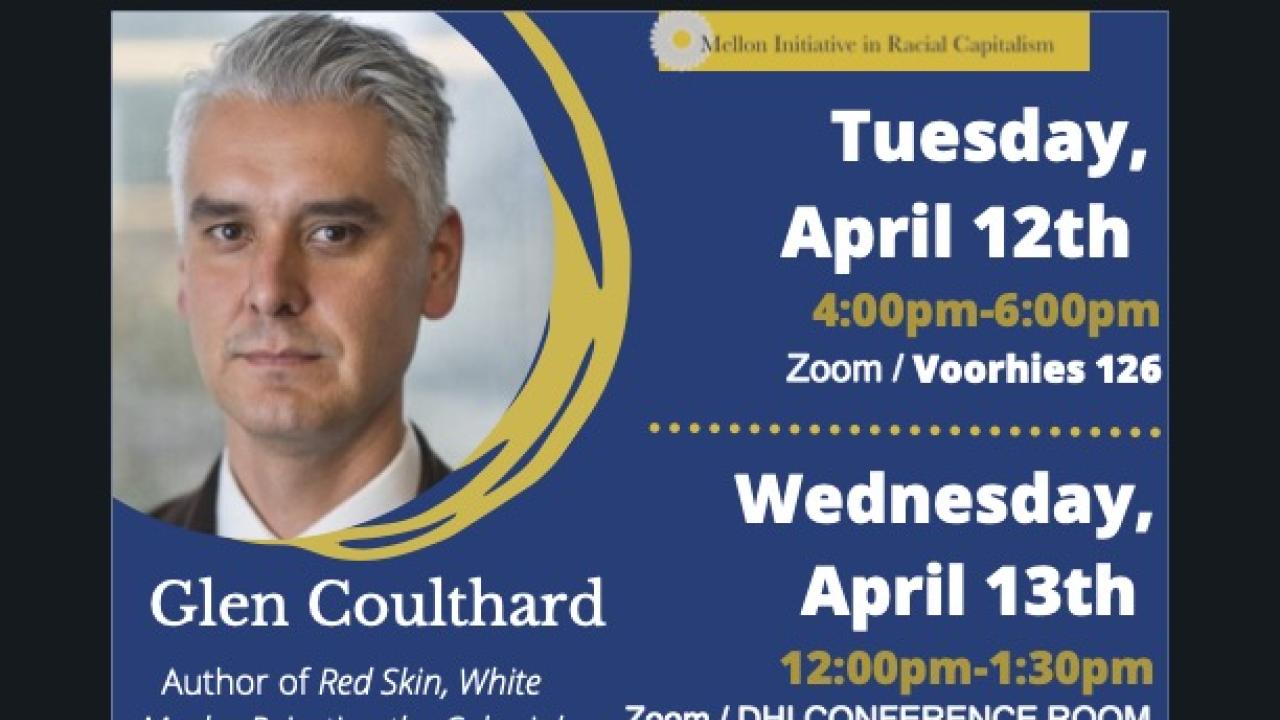
“Once Were Maoists”: Glen Coulthard on International Cross-Fertilization in Indigenous Politics
On Tuesday, April 12th, the Mellon Research Initiative in Racial Capitalism hosted Dr. Glen Coulthard (Yellowknife Dene), associate professor in the First Nations and Indigenous Studies Program and the Department of Political Science at the University of British Columbia, for a lecture titled “Once Were Maoists: Third World Currents in Fourth World Anti-Colonialism.”
Coulthard began by talking about how this research follows his 2014 book Red Skin, White Masks: Rejecting the Colonial Politics of Recognition, which focused on the role of land and place in generating an anti-colonialist critique of capitalism and settler colonialism in the Canadian context. In contrast to that focus on the specific lands and peoples of Canada, Coulthard’s newest project turns toward international influences on Indigenous organizing in British Columbia. “Once Were Maoists: Third World Currents in Fourth World Anti-Colonialism” discusses the influence of Communist China on the B.C. organization Native Alliance for Red Power (NARP), active in the 1960s.
International organizing was not a new tactic for Indigenous peoples prior to the Red Power Movement. Coulthard prefaced NARP’s history by going over examples of how First Nations peoples had successfully been organizing for land and self-determination on an international scale throughout the 20th century. Coulthard described how there were few treaties between First Nations and colonial governments over the course of the century, but the treaties that did exist entailed agreements whereby First Nations would share some of their lands in exchange for payments and promises made by officials representing the state. These treaties were understood as sacred commitments to maintain a relationship of reciprocity which respects the ways of life and relative autonomy of Indigenous peoples. Treaties also provided an international framework for ensuring nation-to-nation relations between Indigenous peoples and Canada. The First Nations have defended this position assiduously, sending formal petitions and delegations to Victoria, Ottawa, and London to plead cases. Coulthard recounted an example of Squamish Chief Joe Capilano who traveled to speak to King Edward about increasing colonization despite the First Nations’ legal right to the land.
Labor struggles also displayed the spread of international thought. Coulthard described the Squamish longshoremen in North Vancouver as “pioneers of Industrial Unionism.” Seasonal wages allowed the Squamish to deploy their labor power strategically in order to protect what was important to them: access to a life on the land and waters determined by customary law and tradition. Defending the seasonal wage became the focus of early Indigenous union activity on the coast. By the time NARP was created, the First Nations were skilled organizers who defended their land and sovereignty in both international and domestic contexts.
In 1927, amendments made to the Indian Act made it illegal for First Nations peoples to hire lawyers or bring about land claims against the government without the government’s consent. Native organization responded by taking the form of “social clubs” like the British Columbia Indian Homemaker’s Society. Members would gather and discuss literature, politics, and so on. In late 1967, NARP was formed as a response to the wrongful acquittal of the white men who raped and killed Rosemary Roper, a First Nations woman in Northern Vancouver. They met as small discussion groups in order to directly respond to the needs of First Nations peoples living in the city. One of the first actions of solidarity that NARP undertook was creating a relationship with the newly formed Black Panther party in Seattle. Eventually, NARP created a ten-point program inspired by the Black Panthers, and Mao Zedong’s “little red book.”
NARP eventually created the Native People’s Friendship Delegation, which consisted of representatives from 18 First Nations who traveled to China to learn about Maoism. Coulthard described how the People’s Republic of China positioned themselves as a revolutionary alternative to the Soviet Union and sought to develop solidarity with the U.S. Black Liberation struggle. Coulthard then detailed the decline of Maoism’s popularity in B.C. as China’s foreign relations and the Vietnam War revealed a contradiction between the state’s theory and its actions. China’s 1975 decision to back apartheid forces in South Africa was a partcular blow to the Black Left, one of NARP’s most influential interlocutors. As Coulthard closed out his talk on the influence of Chinese Maoism on Indigneous politics, he pointed to the way that his research interrogates the portability of theory: can theory be removed from its specific time and location and applied to other circumstances, in this case to different colonial relationships, and if so, at what cost?
